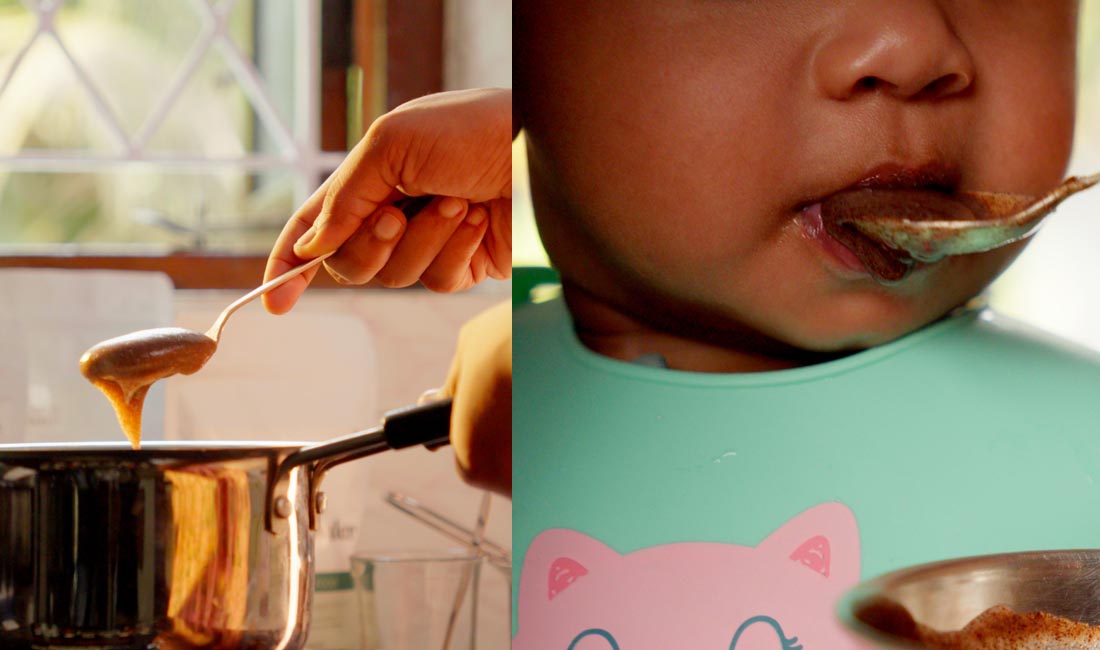
First Solid food for Babies in India - Complete Guide
Introducing Your Baby to Solid Foods
So, your little one is ready to graduate from milk to solid foods? It’s a big step! Let’s break down the basics of introducing solid foods to your baby, tailored to the tastes and traditions of Tamil Nadu.
Important Note: Always consult your pediatrician before starting your baby on solid foods. They can provide personalized advice based on your baby's specific needs and health conditions.
When to Start?
-
The 6-Month Mark: Generally, pediatricians recommend starting solid foods around 6 months of age. This is when your baby can:
- Sit up with support
- Show interest in food
- Lose the tongue-thrust reflex
What to Start With?
When introducing solid foods to your baby, you have the option of either Baby-Led Weaning (BLW) or traditional spoon-feeding. Both methods have their own benefits and drawbacks.
While there's a wide range of food options to choose from, it's crucial to prioritize safety. Let's start by exploring some traditional first foods for babies that have been used for generations.
- Brown Rice Cereal: A traditional and gentle introduction. Rice is often the first grain that is introducted during to babies. It's easily digestible and a staple in many Tamil households. Brown rice cereal is a gentle and nutritious first food for babies, packed with essential vitamins and minerals. It's a great base for mixing with fruits and vegetables.
- Ragi Porridge: Sprouted ragi porridge is a superfood for babies, packed with essential nutrients like calcium, iron, and protein. The sprouting process enhances the nutrient content, making it even more beneficial for your little one's growth and development.
- Raw Banana Powder Porridge: Nendran raw banana porridge is a rich source of potassium and fiber. It's gentle on the baby's digestive system and helps in improving gut health and its also one of kanyakumari's traditional first foods for infants.
- Vegetable Purees: Usually carrots, pumpkin, sweet potato are either steamed or boiled until soft and then they are mashed finely to feed the baby. You can even adjust the consistency and make it even thinner with formula or breast milk.
- Fruit Purees: Steamed and mashed apples are often preffered in infants. It's important to add any kind of fruit or vegetable in thier everyday diet to add fibre and necessary vitamins. Matti bananas, a variety that is native to kanyakumari is often the first solid food given in this part of the world.
How to Introduce New Foods?
- One at a Time: Introduce one new food every 3-4 days to monitor for any allergies or digestive issues.
- Small Portions: Start with tiny amounts and gradually increase as your baby gets used to the new food.
- Pureed Consistency: Begin with pureed foods and gradually introduce mashed or chunkier textures as your baby's motor skills develop.
- Avoid allergenic foods: Foods like peanuts, eggs, tree nuts, fish, and shellfish should be introduced later, under the guidance of your pediatrician.
- Offer iron-rich foods: While weaning a baby, thier iron needs must be taken care of. Keep in mind to add iron rich food like lentils, spinach in thier diet. Natural sweeteners like palm jaggery and palm candy also are rich in iron and are traditionally used for babies.
Home-Cooked or Store-Bought?
- Home-Cooked: This gives you control over ingredients and hygiene. Opt for fresh, organic produce whenever possible.
- Store-Bought: Many reputable brands like Purely South offer convenient, safe, and hygienic baby food options made with clean ingredients. If purchasing these products allows you more time to bond and play with your baby amidst your busy schedule, it's a wise choice.
Feeding Tips:
- Offer a Variety: Introduce a variety of flavors and textures to help your baby develop a diverse palate.
- Avoid Sugary Drinks and Juices: Stick to water or breast milk.
- Listen to Your Baby's Cues: Pay attention to their hunger and fullness signals. Don't force-feed.
- Be Patient: It may take several tries for your baby to accept a new food. Don't get discouraged.
-
Gagging vs. Choking : It's important to understand the difference between gagging and choking. Gagging is a normal reflex that helps protect babies from choking. It often involves a coughing sound and may look alarming, but it's usually harmless. However, choking is a serious condition that requires immediate attention. If your baby is choking, they will be unable to cough, cry, or breathe.
If your baby is gagging, stay calm and let them work it out on their own. However, if they're choking, seek medical attention immediately.
Remember, every baby is different. With a little planning and patience, you can introduce solid foods to your baby in a way that's both nutritious and enjoyable.
